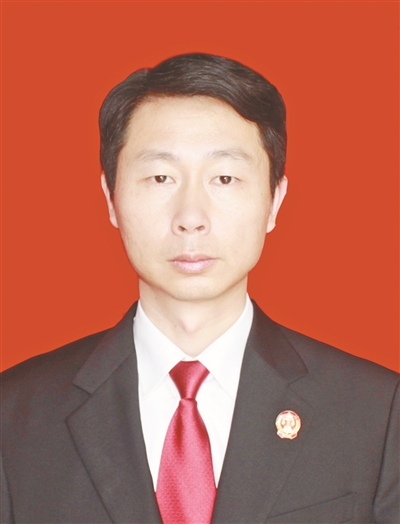Judicial aid helps girl fulfill dream
 |
|
Li Chongli, director of the Law Enforcement Bureau of the Xinyong County People's Court in eastern China's Jiangxi province. [Photo/People's Court Daily] |
"Through the case, I deeply felt that law is both authoritative and holy, and I was deeply moved by the lawyer and his team for their professionalism..." Zhou Wenqi, a lawyer from the Xinyong County People's Court in eastern China's Jiangxi province showed the short message to his colleague Li Chongli.
Li immediately realized that the message came from a young lady named Liu Junxia, with whom he had a case back in 2013.
Three years ago, Liu was a senior one student at the Ren Bishi Middle School. She was lively and happy, an athlete and a good student.
However, a sudden accident changed her life.
In the afternoon of Aug 20, 2013, when Liu was on her way to supper, she was knocked down by a motorcycle and seriously fractured her right femur. In the following months, she had to walk with a stick.
Zhou Yang, the motorcycle rider, turned out to be a young student at a local technical secondary school who lived an economically-disadvantaged life and whose parents could only afford part of Liu’s medical expenses.
To look after her daughter, Liu's mom had no choice but to quit her job, and Liu's father became the only breadwinner for the family. Liu, a bright and optimistic young lady in her teens, gradually become gloomy and rarely spoke to people.
To seek justice, Liu finally chose to file a lawsuit against Zhou, with the help and support of her parents. According to the judgment, Zhou was required to pay Liu more than 60,000 yuan ($9,046) in compensation. Later, Liu also applied to the court for compulsory enforcement.
After receiving the case, lawyer Li Chongli tried his best to minimize the negative impact of the case on Liu.
After a thorough investigation of bank accounts, everyday income, and other properties, Li found that Zhou Yang and his whole family lived at or near the poverty line. In this case, it was hard to implement the compulsory enforcement.
To relive pressure on Liu and her family, Li helped raise a donation of 1,000 yuan ($151) for Liu and coordinated frequently with Zhou Yang and his family. However, Zhou’s parents still couldn’t afford the compensation. The case, at one point, seemed to be deadlocked.
In December of 2015, a glimmer of hope suddenly emerged.
After filing relevant forms, Liu was given a chance to apply for national judicial aid. In early 2016, Liu received around 60,000 yuan ($9,046) from an aid program, part of China's welfare system that provides compensation for victims of accidents and crimes when the perpetrator cannot.
When Li told the news to Liu, a long-lost smile appeared on her face.
"You are a grade three student now, and you should be fully prepared to sit the college entrance exam this year," Li said, just as an elderly relative would when he gave the money to Liu.
"I promise that I will study as hard as I can," responded Liu.
After the national exam in early June this year, Li hear the news that Liu received a good mark and was admitted to one of her favorite universities. And now, thanks to the compensation, Liu will have no issues paying for tuition and other expenses.
In half a month's time, Liu will be a college student. Li feels happy for the young lady and wishes her good luck as she joins campus life.







